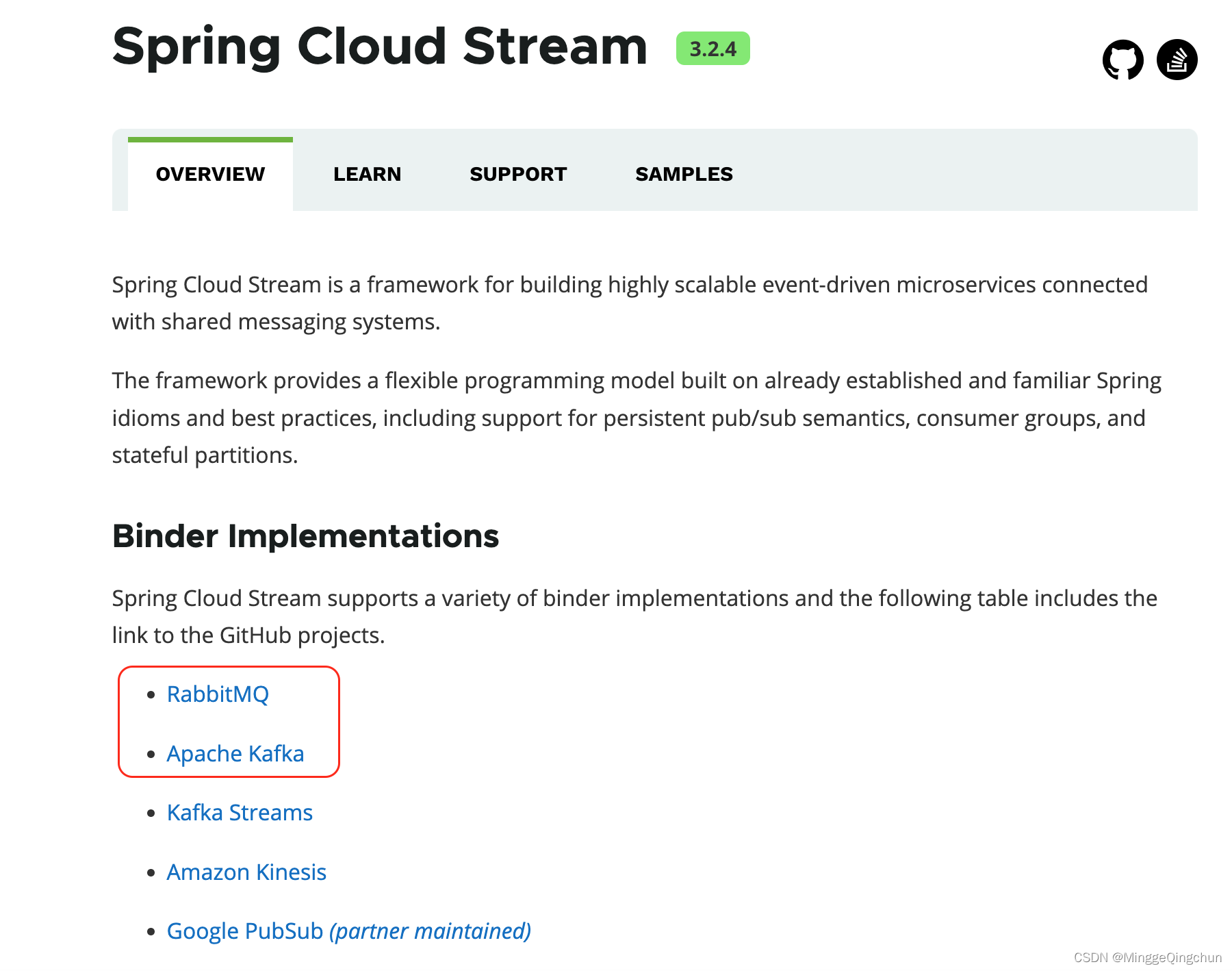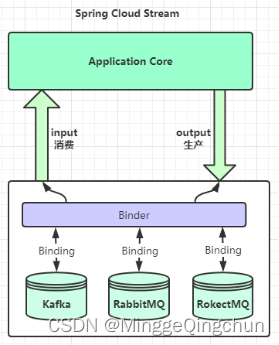阅读本文前可先参考
一、Spring Cloud Stream
在微服务的开发过程中,会经常用到消息中间件,通过消息中间件在服务与服务之间传递消息,不管使用哪款消息中间件,如RabbitMQ、Kafka和RocketMQ,那么消息中间件和服务之间都有耦合性(如原来使用RabbitMQ,要替换为RocketMQ,那么微服务都需要修改,变动会比较大),因为这两款消息中间件有一些区别,如果我们Spring Cloud Stream来整合我们的消息中间件,就可以降低微服务和消息中间件的耦合性,做到轻松在不同消息中间件间切换
Spring Cloud Stream就是负责整合我们的消息中间件,降低微服务和消息中间件的耦合性,做到轻松在不同消息中间件间切换
官网地址:
Spring Cloud Stream是一个框架,用于构建与共享消息系统连接的高度可伸缩的事件驱动微服务。
Spring Cloud Stream解决了开发人员无感知的使用消息中间件的问题,Spring Cloud Stream对消息中间件的进一步封装,可以做到代码层面对消息中间件的无感知,甚至于动态的切换中间件(rabbitmq切换为rocketmq或者kafka),使得微服务开发的高度解耦。
注:
目前Spring Cloud Stream仅支持RabbitMQ、Kafka,Spring Cloud Alibaba新写了一个starter可以支持RocketMQ
Spring Cloud Stream架构
Spring Cloud Stream 是一个构建消息驱动微服务的框架
应用程序通过Input(相当于消费者consumer)、Output(相当于生产者producer)来与Spring Cloud Stream中Binder交互,而Binder负责与消息中间件交互,因此,我们只需关注如何与Binder交互即可,而无需关注与具体消息中间件的交互
1、Binder
与外部消息中间件集成的组件,用来创建Binding,各消息中间件都有自己的 Binder 实现
Kafka 的实现 KafkaMessageChannelBinder
RabbitMQ 的实现 RabbitMessageChannelBinder
RocketMQ 的实现 RocketMQMessageChannelBinder
2、Binding
包括 Input Binding 和 Output Binding
Binding 在消息中间件与应用程序提供的 Provider 和 Consumer 之间提供了一个桥梁,实现了开发者只需使用应用程序的 Provider 或 Consumer 生产或消费数据即可,屏蔽了开发者与底层消息中间件的接触
3、Input
应用程序通过input(相当于消费者consumer)与Spring Cloud Stream中Binder交互,而Binder负责与消息中间件交互,因此,我们只需关注如何与Binder交互即可,而无需关注与具体消息中间件的交互
4、Output
output(相当于生产者producer)与Spring Cloud Stream中Binder交互
| 组成 | 说明 |
| Binder | Binder是应用与消息中间件之间的封装,目前实现了Kafka和RabbitMQ的Binder,通过Binder可以很方便的连接中间件,可以动态的改变消息类型(对应于Kafka的topic,RabbitMQ的exchange),这些都可以通过配置文件来实现 |
| @Input | 该注解标识输入通道,通过该输入通道接收消息进入应用程序 |
| @Output | 该注解标识输出通道,发布的消息将通过该通道离开应用程序 |
| @StreamListener | 监听队列,用于消费者的队列的消息接收 |
| @EnableBinding | 将信道channel和exchange、topic绑定在一起 |
二、Spring Cloud Stream应用(RocketMQ)
(一)Spring Cloud Stream应用(RocketMQ)
1、创建Springboot工程 springcloud-alibaba-4-stream-rocketmq
2、添加依赖 spring-cloud-starter-stream-rocketmq
<!--spring-cloud-starter-stream-rocketmq-->
<dependency>
<groupId>com.alibaba.cloud</groupId>
<artifactId>spring-cloud-starter-stream-rocketmq</artifactId>
</dependency><groupId>com.bjpowernode</groupId>
<artifactId>31-rocketmq-spring-cloud-stream</artifactId>
<version>1.0.0</version>
<name>31-rocketmq-spring-cloud-stream</name>
<description>31-rocketmq-spring-cloud-stream project for Spring Boot</description>
<properties>
<java.version>1.8</java.version>
<project.build.sourceEncoding>UTF-8</project.build.sourceEncoding>
<project.reporting.outputEncoding>UTF-8</project.reporting.outputEncoding>
<spring-boot.version>2.2.5.RELEASE</spring-boot.version>
<spring-cloud-alibaba.version>2.2.1.RELEASE</spring-cloud-alibaba.version>
</properties>
<dependencies>
<dependency>
<groupId>org.springframework.boot</groupId>
<artifactId>spring-boot-starter-web</artifactId>
</dependency>
<!--spring-cloud-starter-stream-rocketmq-->
<dependency>
<groupId>com.alibaba.cloud</groupId>
<artifactId>spring-cloud-starter-stream-rocketmq</artifactId>
</dependency>
<dependency>
<groupId>org.projectlombok</groupId>
<artifactId>lombok</artifactId>
</dependency>
</dependencies>
<dependencyManagement>
<dependencies>
<dependency>
<groupId>org.springframework.boot</groupId>
<artifactId>spring-boot-dependencies</artifactId>
<version>${spring-boot.version}</version>
<type>pom</type>
<scope>import</scope>
</dependency>
<dependency>
<groupId>com.alibaba.cloud</groupId>
<artifactId>spring-cloud-alibaba-dependencies</artifactId>
<version>${spring-cloud-alibaba.version}</version>
<type>pom</type>
<scope>import</scope>
</dependency>
</dependencies>
</dependencyManagement>
<build>
<plugins>
<plugin>
<groupId>org.apache.maven.plugins</groupId>
<artifactId>maven-compiler-plugin</artifactId>
<version>3.8.1</version>
<configuration>
<source>1.8</source>
<target>1.8</target>
<encoding>UTF-8</encoding>
</configuration>
</plugin>
<plugin>
<groupId>org.springframework.boot</groupId>
<artifactId>spring-boot-maven-plugin</artifactId>
<version>2.3.0.RELEASE</version>
<configuration>
<mainClass>com.bjpowernode.Application</mainClass>
</configuration>
<executions>
<execution>
<id>repackage</id>
<goals>
<goal>repackage</goal>
</goals>
</execution>
</executions>
</plugin>
</plugins>
</build>3、application.properties配置文件
server.port=8081
spring.application.name=springcloud-alibaba-4-stream-rocketmq
# 日志级别
logging.level.com.alibaba.cloud.stream.binder.rocketmq=INFO
########## RocketMQ 通用配置
# 客户端接入点,必填,rocketmq的连接地址, binder高度抽象
spring.cloud.stream.rocketmq.binder.name-server=192.168.133.128:9876
########## 生产者Producer Config
# output 的配置如下: bindings 具体生产消息、消费消息的桥梁(消费者Consumer和生产者Producer的destination 目的地必须保持一致)
spring.cloud.stream.bindings.output.destination=test-topic
spring.cloud.stream.bindings.output.content-type=text/plain
spring.cloud.stream.bindings.output.group=test-group
########## 消费者Consumer Config
# input 的配置:(消费者Consumer和生产者Producer的destination 目的地必须保持一致)
spring.cloud.stream.bindings.input.destination=test-topic
spring.cloud.stream.bindings.input.content-type=text/plain
spring.cloud.stream.bindings.input.group=test-group4、消息发送(生产者)
@Service
public class SenderService {
//spring cloud stream里面发消息通过 Source 发送
@Autowired
private Source source;
//原来springboot里面通过 RocketMQTemplate 发送
/**
* 发送消息的方法
*
* @param msg
* @throws Exception
*/
public void send(String msg) throws Exception {
// source.output() == MessageChannel 消息通道
boolean flag = source.output().send(MessageBuilder.withPayload(msg).build());
System.out.println("消息发送:" + flag);
}
}5、消息接收(消费者)
@Service
public class ReceiveService {
//spring cloud stream里面发消息通过 Sink 发送
@Autowired
private Sink sink;
//原来springboot里面通过 RocketMQTemplate 发送
/* 接收消息
第一种:通过手动调用receive()方法接收消息,while循环监听消息
* */
public void receive() {
while(true){
// SubscribableChannel = sink.input() 消息订阅的信道
sink.input().subscribe((Message<?> message) -> {
System.out.println("Sink接收到的消息是:" + message.getPayload());
});
}
}
/* 接收消息
第二种:通过@StreamListener监听消息,不需要调用receiveMessage(String message)方法
* */
@StreamListener(value = Sink.INPUT)
public void receiveMessage(String message) {
System.out.println("StreamListener接收到的消息是:" + message);
}
}6、springboot启动程序类
import com.company.consumer.ReceiveService;
import com.company.producer.SenderService;
import org.springframework.beans.factory.annotation.Autowired;
import org.springframework.boot.CommandLineRunner;
import org.springframework.boot.SpringApplication;
import org.springframework.boot.autoconfigure.SpringBootApplication;
import org.springframework.cloud.stream.annotation.EnableBinding;
import org.springframework.cloud.stream.messaging.Sink;
import org.springframework.cloud.stream.messaging.Source;
@EnableBinding(value = {Source.class, Sink.class}) //使其生效
@SpringBootApplication
//Spring boot的CommandLineRunner接口主要用于实现在应用初始化后,去执行一段代码块逻辑,这段初始化代码在整个应用生命周期内只会执行一次
public class Stream4RocketmqApplication implements CommandLineRunner {
@Autowired
private SenderService senderService;
@Autowired
private ReceiveService receiveService;
public static void main(String[] args) {
SpringApplication.run(Stream4RocketmqApplication.class, args);
}
@Override
public void run(String... args) throws Exception {
senderService.send("Hello spring cloud stream rocketmq!");
receiveService.receive();
}
}(二)Spring Cloud Stream自定义信道
消息传递主要使用的是系统提供的 Source (output)、Sink(input);因此我们自定义Source和Sink接口即可
server.port=8081
spring.application.name=springcloud-alibaba-4-stream-rocketmq
# 日志级别
logging.level.com.alibaba.cloud.stream.binder.rocketmq=INFO
########## RocketMQ 通用配置
# 客户端接入点,必填,rocketmq的连接地址, binder高度抽象
spring.cloud.stream.rocketmq.binder.name-server=192.168.133.128:9876
########## 生产者Producer Config
# output 的配置如下: bindings 具体生产消息、消费消息的桥梁(消费者Consumer和生产者Producer的destination 目的地必须保持一致)
spring.cloud.stream.bindings.output.destination=test-topic
spring.cloud.stream.bindings.output.content-type=text/plain
spring.cloud.stream.bindings.output.group=test-group
# output1 要对应到一个Source里面去
spring.cloud.stream.bindings.output1.destination=test-topic1
spring.cloud.stream.bindings.output1.content-type=text/plain
spring.cloud.stream.bindings.output1.group=test-group1
# output2 要对应到一个Source里面去
spring.cloud.stream.bindings.output2.destination=test-topic2
spring.cloud.stream.bindings.output2.content-type=text/plain
spring.cloud.stream.bindings.output2.group=test-group2
########## 消费者Consumer Config
# input 的配置:(消费者Consumer和生产者Producer的destination 目的地必须保持一致)
spring.cloud.stream.bindings.input.destination=test-topic
spring.cloud.stream.bindings.input.content-type=text/plain
spring.cloud.stream.bindings.input.group=test-group
spring.cloud.stream.bindings.input1.destination=test-topic1
spring.cloud.stream.bindings.input1.content-type=text/plain
spring.cloud.stream.bindings.input1.group=test-group1
spring.cloud.stream.rocketmq.bindings.input1.consumer.tags=myTag
spring.cloud.stream.bindings.input2.destination=test-topic2
spring.cloud.stream.bindings.input2.content-type=text/plain
spring.cloud.stream.bindings.input2.group=test-group2消息发送(生产者)
public interface MySource {
/**
* Name of the output channel.
*/
String OUTPUT1 = "output1";
/**
* Name of the output channel.
*/
String OUTPUT2 = "output2";
/**
* @return output channel
*/
@Output(MySource.OUTPUT1)
MessageChannel output1();
@Output(MySource.OUTPUT2)
MessageChannel output2();
}import org.apache.rocketmq.common.message.MessageConst;
import org.springframework.beans.factory.annotation.Autowired;
import org.springframework.cloud.stream.messaging.Source;
import org.springframework.messaging.Message;
import org.springframework.messaging.MessageHeaders;
import org.springframework.messaging.support.MessageBuilder;
import org.springframework.stereotype.Service;
import org.apache.rocketmq.spring.core.RocketMQTemplate;
import org.springframework.util.MimeTypeUtils;
@Service
public class SenderService {
//spring cloud stream里面发消息通过 Source 发送
@Autowired
private Source source;
//原来springboot里面通过 RocketMQTemplate 发送
@Autowired
private MySource mySource;
@Autowired
private RocketMQTemplate rocketMQTemplate;
/**
* 发送消息的方法
*
* @param msg
* @throws Exception
*/
public void send(String msg) throws Exception {
// source.output() == MessageChannel 消息通道
boolean flag = source.output().send(MessageBuilder.withPayload(msg).build());
System.out.println("消息发送:" + flag);
}
/**
* 发送消息的方法
*
* @param msg
* @throws Exception
*/
public void send(String msg) throws Exception {
// source.output() == MessageChannel 消息通道
boolean flag = source.output().send(MessageBuilder.withPayload(msg).build());
System.out.println("消息发送:" + flag);
}
/**
* 发送消息的方法
*
* @param msg
* @throws Exception
*/
public void send1(String msg) throws Exception {
// source.output() == MessageChannel 消息通道
boolean flag = mySource.output1().send(MessageBuilder.withPayload(msg).build());
System.out.println("消息发送1:" + flag);
}
/**
* 发送消息的方法,发到3个topic中
*
* @param msg
* @throws Exception
*/
public void multiSend(String msg) throws Exception {
// source.output() == MessageChannel 消息通道
boolean flag = source.output().send(MessageBuilder.withPayload(msg).build());
System.out.println("消息发送:" + flag);
// source.output() == MessageChannel 消息通道
boolean flag1 = mySource.output1().send(MessageBuilder.withPayload(msg).build());
System.out.println("消息发送1:" + flag1);
// source.output() == MessageChannel 消息通道
boolean flag2 = mySource.output2().send(MessageBuilder.withPayload(msg).build());
System.out.println("消息发送2:" + flag2);
}
public <T> void sendObject(T msg, String tag) throws Exception {
Message message = MessageBuilder.withPayload(msg)
.setHeader(MessageConst.PROPERTY_TAGS, tag)
.setHeader(MessageHeaders.CONTENT_TYPE, MimeTypeUtils.APPLICATION_JSON)
.build();
boolean flag2 = mySource.output1().send(message);
System.out.println("对象消息发送2:" + flag2);
}
/**
* 发送消息的方法
*
* @param msg
* @throws Exception
*/
public void sendTemplate(String msg) throws Exception {
Message message = MessageBuilder.withPayload(msg)
.setHeader(MessageHeaders.CONTENT_TYPE, MimeTypeUtils.APPLICATION_JSON)
.build();
rocketMQTemplate.send("test-topic1", message);
System.out.println("发送完毕......");
}
}消息接收(消费者)
public interface MySink {
/**
* Input channel name.
*/
String INPUT1 = "input1";
/**
* Input channel name.
*/
String INPUT2 = "input2";
/**
* @return input channel.
*/
@Input(MySink.INPUT1)
SubscribableChannel input1();
/**
* @return input channel.
*/
@Input(MySink.INPUT2)
SubscribableChannel input2();
}@Service
public class ReceiveService {
//spring cloud stream里面发消息通过 Sink 发送
@Autowired
private Sink sink;
//原来springboot里面通过 RocketMQTemplate 发送
@Autowired
private MySink mySink;
/* 接收消息
第一种:通过手动调用receive()方法接收消息,while循环监听消息
* */
public void receive() {
while(true){
// SubscribableChannel = sink.input() 消息订阅的信道
sink.input().subscribe((Message<?> message) -> {
System.out.println("Sink接收到的消息是:" + message.getPayload());
});
}
}
/* 接收消息
第二种:通过@StreamListener监听消息,不需要调用receiveMessage(String message)方法
* */
@StreamListener(value = Sink.INPUT)
public void receiveMessage(String message) {
System.out.println("StreamListener接收到的消息是:" + message);
}
public void receive1() {
while (true){
// SubscribableChannel = sink.input() 消息订阅的信道
mySink.input1().subscribe((Message<?> message) -> {
System.out.println("input 1---" + message.getPayload());
});
}
}
@StreamListener(value = MySink.INPUT1)
public void receiveMessage1(String message) {
System.out.println("接收到的消息是1:" + message);
}
@StreamListener(value = MySink.INPUT2)
public void receiveMessage2(String message) {
System.out.println("接收到的消息是2:" + message);
}
}(三)Spring Cloud Stream事务消息
#--------------------------事务消息-------------------------------------
#生产的配置
spring.cloud.stream.bindings.outputTX.destination=TransactionTopic
spring.cloud.stream.bindings.outputTX.content-type=application/json
spring.cloud.stream.rocketmq.bindings.outputTX.producer.group=myTxProducerGroup
#是否为事务消息,默认为false表示不是事务消息,true表示是事务消息
spring.cloud.stream.rocketmq.bindings.outputTX.producer.transactional=true
#消费的配置:
spring.cloud.stream.bindings.inputTX.destination=TransactionTopic
spring.cloud.stream.bindings.inputTX.content-type=text/plain
spring.cloud.stream.bindings.inputTX.group=transaction-group
spring.cloud.stream.rocketmq.bindings.inputTX.consumer.broadcasting=false消息发送(生产者)
@Component
public class Sender {
@Autowired
private MySource mySource;
public <T> void sendTransactionalMsg(T msg, int num) throws Exception {
MessageBuilder builder = MessageBuilder.withPayload(msg)
.setHeader(MessageHeaders.CONTENT_TYPE, MimeTypeUtils.APPLICATION_JSON)
.setHeader("test", String.valueOf(num));
//.setHeader(RocketMQHeaders.TAGS, "binder");
Message message = builder.build();
mySource.outputTX().send(message);
}
}import org.apache.rocketmq.spring.annotation.RocketMQTransactionListener;
import org.apache.rocketmq.spring.core.RocketMQLocalTransactionListener;
import org.apache.rocketmq.spring.core.RocketMQLocalTransactionState;
import org.springframework.messaging.Message;
@RocketMQTransactionListener(txProducerGroup = "myTxProducerGroup", corePoolSize = 5, maximumPoolSize = 10)
public class TransactionListenerImpl implements RocketMQLocalTransactionListener {
/**
* 执行本地事务:也就是执行本地业务逻辑
*
* @param msg
* @param arg
* @return
*/
@Override
public RocketMQLocalTransactionState executeLocalTransaction(Message msg, Object arg) {
Object num = msg.getHeaders().get("test");
if ("1".equals(num)) {
System.out.println("executer: " + new String((byte[]) msg.getPayload()) + " unknown");
return RocketMQLocalTransactionState.UNKNOWN;
}
else if ("2".equals(num)) {
System.out.println("executer: " + new String((byte[]) msg.getPayload()) + " rollback");
return RocketMQLocalTransactionState.ROLLBACK;
}
System.out.println("executer: " + new String((byte[]) msg.getPayload()) + " commit");
return RocketMQLocalTransactionState.COMMIT;
}
/**
* 回调检查
*
* @param msg
* @return
*/
@Override
public RocketMQLocalTransactionState checkLocalTransaction(Message msg) {
System.out.println("check: " + new String((byte[]) msg.getPayload()));
return RocketMQLocalTransactionState.COMMIT;
}
}消息接收(消费者)
@StreamListener(value = MySink.INPUTTX)
public void receiveTransactionMessage(String message) {
System.out.println("接收到的 事务 消息是:" + message);
}三、Spring Cloud Stream RocketMQ配置选项
RocketMQ Binder Properties
spring.cloud.stream.rocketmq.binder.name-server
RocketMQ NameServer 地址(老版本使用 namesrv-addr 配置项);
Default: 127.0.0.1:9876.
spring.cloud.stream.rocketmq.binder.access-key
阿里云账号 AccessKey。
Default: null.
spring.cloud.stream.rocketmq.binder.secret-key
阿里云账号 SecretKey。
Default: null.
spring.cloud.stream.rocketmq.binder.enable-msg-trace
是否为 Producer 和 Consumer 开启消息轨迹功能
Default: true.
spring.cloud.stream.rocketmq.binder.customized-trace-topic
消息轨迹开启后存储的 topic 名称。
Default: RMQ_SYS_TRACE_TOPIC.
RocketMQ Consumer Properties
下面的这些配置是以 spring.cloud.stream.rocketmq.bindings.<channelName>.consumer. 为前缀的 RocketMQ Consumer 相关的配置。
enable
是否启用 Consumer;
默认值: true.
tags
Consumer 基于 TAGS 订阅,多个 tag 以 || 分割;
默认值: empty.
sql
Consumer 基于 SQL 订阅;
默认值: empty.
broadcasting
Consumer 是否是广播消费模式。如果想让所有的订阅者都能接收到消息,可以使用广播模式;
默认值: false.
orderly
Consumer 是否同步消费消息模式;
默认值: false.
delayLevelWhenNextConsume
异步消费消息模式下消费失败重试策略:
-1,不重复,直接放入死信队列
0,broker 控制重试策略
>0,client 控制重试策略
默认值: 0.
suspendCurrentQueueTimeMillis
同步消费消息模式下消费失败后再次消费的时间间隔;
默认值: 1000.
RocketMQ Provider Properties
下面的这些配置是以 spring.cloud.stream.rocketmq.bindings.<channelName>.producer. 为前缀的 RocketMQ Producer 相关的配置;
enable
是否启用 Producer;
默认值: true.
group
Producer group name;
默认值: empty.
maxMessageSize
消息发送的最大字节数;
默认值: 8249344.
transactional
是否发送事务消息;
默认值: false.
sync
是否使用同步得方式发送消息;
默认值: false.
vipChannelEnabled
是否在 Vip Channel 上发送消息;
默认值: true.
sendMessageTimeout
发送消息的超时时间(毫秒);
默认值: 3000.
compressMessageBodyThreshold
消息体压缩阀值(当消息体超过 4k 的时候会被压缩);
默认值: 4096.
retryTimesWhenSendFailed
在同步发送消息的模式下,消息发送失败的重试次数;
默认值: 2.
retryTimesWhenSendAsyncFailed
在异步发送消息的模式下,消息发送失败的重试次数;
默认值: 2.
retryNextServer
消息发送失败的情况下是否重试其它的 broker;
默认值: false
由此开发使用RocketMQ有两种选择
1、SpringBoot + RocketMQ整合实现消息传送;
2、使用Spring Cloud Stream对消息中间件的包装,来实现消息传送


